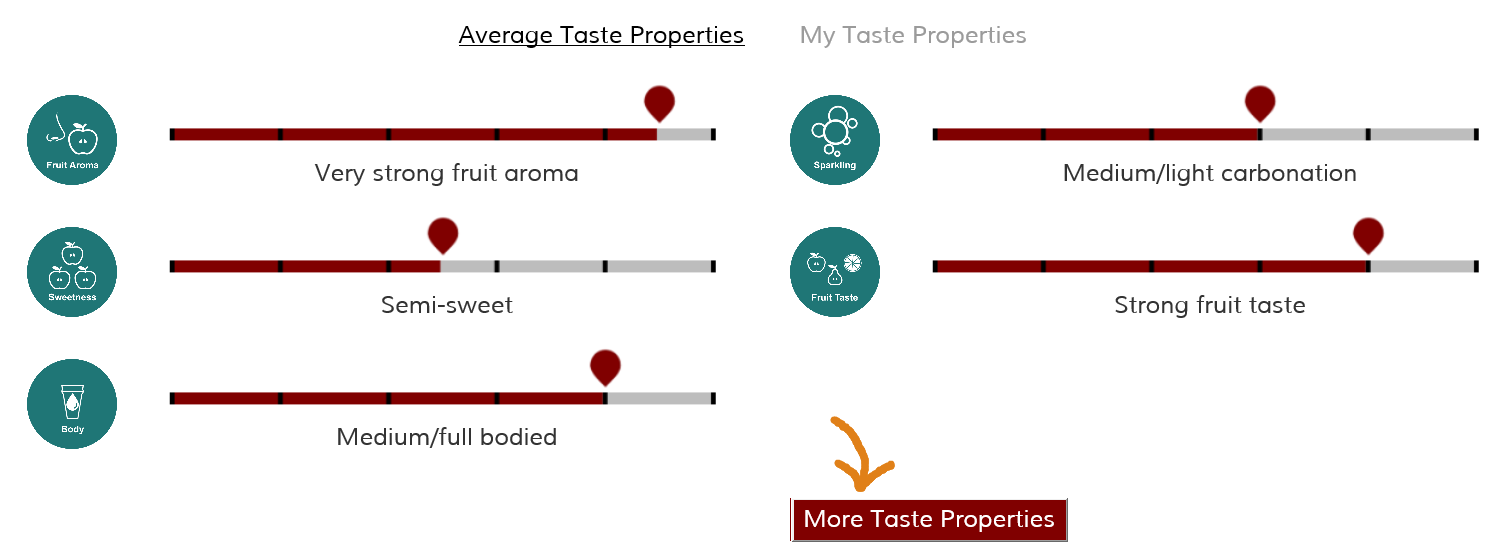As with wines, there are many factors that influence how a cider tastes. Once you start to understand these factors – the taste properties of cider – you begin to understand why ciders can taste so differently from one another. It’s not just a matter of how sweet or dry a cider is – there’s a lot more going on behind the scenes.
Cider Expert has identified a subset of taste properties that proven very useful. We picked these because they highlight some of the range of tastes available in commercial and craft ciders. This subset is (mostly) easy to understand without prior training, and is the most helpful in determining if someone will like the cider.
As a user of Cider Expert, we enourage you to use these to help decide which cider to drink, and help in the crowd-sourced rating effort by evaluating some (or all) of the taste properties yourself.
Taste properties are meant to be fairly objective ratings ("star" ratings are subjective - that's how much you like the cider). However two people should generally agree on relative ratings, for instance that Cider 1 is more carbonated and sweeter than Cider 2. Those two people might disagree somewhat on the exact ratings to give, but in our experience, ratings usually do not differ significantly.
The "Average Taste Properties" show an aggregate rating from all users that have rated this cider. "My Taste Properties" is where you can provide your own ratings for this cider. You may agree or disagree with existing ratings, and that's ok.
So when looking at ciders, you'll see pages like:

Cider Expert also has two categories of taste properties. The initial, smaller set you see are the easiest to recognize. When you click on the More Taste Properties button indicated above, you will see an addition set of taste properties. These may be somewhat more challenging to identify, and you are free to rate as many or as few taste properties as you feel confident with.
| Fruit Aroma | The character of the fruit can come through in many ways, and it will usually be very different than unfermented apple juice. For example, the aroma from the fruit character may come across as fruity, floral, or spicy. |
| Sparkling | Ciders range from completely still to champagne-like bubbles. |
| Sweetness | How sweet the cider tastes, not a strict measure of the sugars. The perceived sweetness is related to the residual sugar in the cider. However other factors can make the cider taste sweeter or dryer than expected given the amount of sugar. |
| Fruit Taste | Like Fruit Aroma, the fruit character may not taste like apple, even in a pure apple cider. Some ciders, especially very dry, have very little taste; others have very strong tastes, largely from the sourness or funkiness. This rates how strong the fruit character comes through in the taste, which may be reminiscent of various fruits or spices. |
| Body | A full-bodied cider will feel thicker and will linger for a long time. A thin-bodied cider will not linger, and may even taste watery. |
| Turbidity | How cloudy or hazy does the cider look? This is often due to the amount of filtration. Most American and French ciders, for instance, are quite clear (very low turbidity). |
| Tartness | This is a taste coming from the acid content in a cider, causing a initial bite or "tingling." In traditional cider apples it is primarily from the malic acid in "sharp" apples. Tartness in some kinds of fruit ciders may be caused by other acids. |
| Sourness | Like the "sour" in sour beers, and is a taste caused by some acids. Common in Spanish and Basque sidras, and present some fruit ciders, but less common otherwise. This is typically from larger amounts of lactic acid. It tends to have a "softer" mouth feel than ciders rich in malic acid. |
| Acidity | While tartness and sourness are due to distinct acids in the cider, this represents the total acid content. |
| Bitterness | One of the five basic tastes. Common examples include coffee, unsweetened cocoa, and olives. In traditional ciders this is typically from tannins, though other bittering agents are sometimes used. |
| Astringency | Astringency can leave a puckering feeling in your mouth, and dryness after swallowing. This same feeling can come from highly-steeped tea, as well as other fruits, like blackthorn, quince and persimmon. Astringency in ciders is typically from tannins. |
| Funky | Yes, this is a term. It's not as specific as some taste properties, and includes earthy and yeasty aftertastes, and generally tastes evoking a "farmyard". Depending on the cider, it may be from Brettanomyces. |